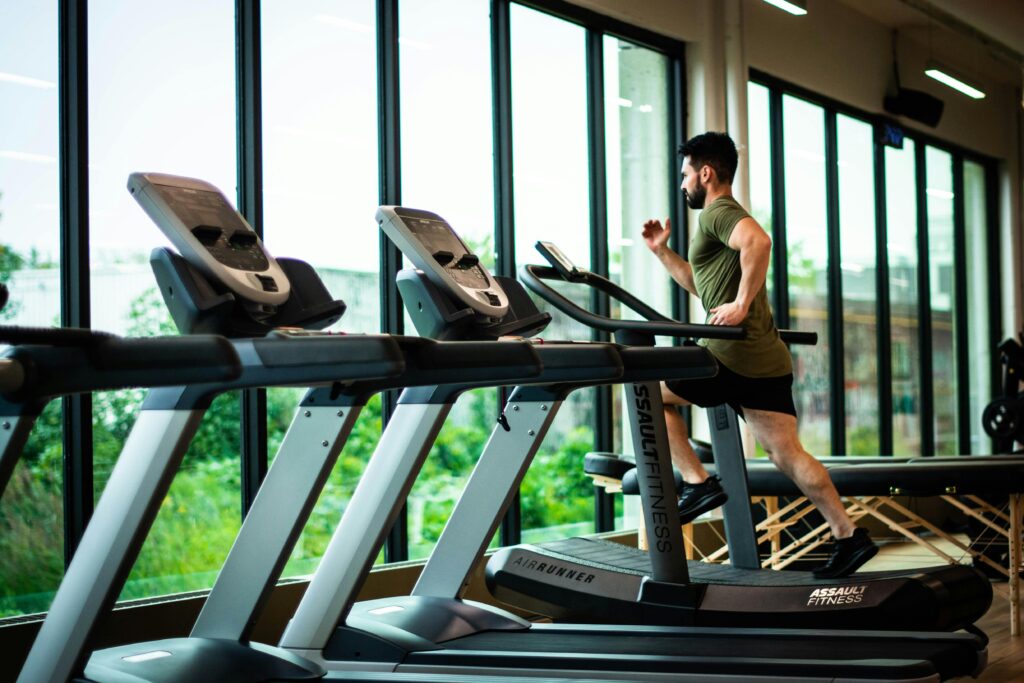Cardio is Super Overrated for Weight Loss – Best Alternatives
Physical activity burns calories and if your goal is weight loss then it stands to reason that if you increase physical activity you’ll burn more calories and lose weight. This means cardio to most people. Unfortunately, it’s not that simple. In fact, I’d even say cardio is super overrated for weight loss.

Keep reading to find out why cardio is super overrated for weight loss and what to do instead. Learn about the downside of doing too much cardio and its effects on the body. Plus, find out why you should never skip out on cardio regardless of your fitness goals.
What is Cardio
Cardio is a form of physical activity that elevates your heart rate and gets you breathing harder. There are different forms of cardio, such as low-intensity activities such as brisk walking or high-intensity exercises such as running.
Cardio workouts are a staple in the fitness community. Cardio stands for cardiovascular training and can help train the body to perform better in high-intensity situations.
Benefits
Training cardio can help increase VO2 max, a measurement of how much oxygen the body uses during intense exercise. It’s one of the best ways to measure cardiovascular health. Cardio is also a good way to improve endurance and reduce your risk of heart disease. Regular cardio practice can help decrease blood pressure, manage blood sugar, and improve brain function.
There are also a plethora of mental health benefits from cardio such as enhancing mood, increasing happiness chemicals therefore decreasing depression, and improving sleep. Other benefits include increased bone health, a strengthened immune system, and enhanced digestion.
One benefit I’m actively leaving out is weight loss. While some fitness plans include cardio to manage a healthy weight, I think cardio is super overrated for weight loss.
Why Cardio is Super Overrated for Weight Loss
So, why is cardio super overrated for weight loss? Cardio is a way to burn calories, right? Therefore it should be a good way to manage weight. In reality, cardio does not do exactly what you think during an exercise. A standard cardio session of moderate activity does not burn an incredibly high amount of calories.
Plus, after an intense cardio session, the body tends to reduce metabolism as a side effect of the intense workout. This is to compensate for the increased expenditure of energy during exercise. It is why intense cardio actually tends to slow down your metabolism. In other words, your body starts to burn fewer calories at rest than normal after a cardio session.
What To Do Instead
Personally, I’m a huge fan of resistance training in order to increase fitness and as a result manage weight. As opposed to concentrating on a number on the scale, resistance training or strength training tends to get you in the mindset of becoming stronger. As a result of increased muscle, your body starts to use the stored energy, aka fat, to fuel your workouts, help during recovery, and grow stronger.
Metabolism and Muscle
Not only does strength training reduce fat by using our own body’s energy storage, but it also positively affects our metabolism. Increasing our muscle mass increases metabolic rate. This is because our muscles need more energy at rest. Therefore, if you increase muscle mass then you increase the calories you burn while literally doing nothing. Calories burned during a workout or exercise account for a small portion of the total calories burned a day. Most of the calories burned in a day come from what you do at rest. So to increase calories burned at rest, all we need to do is increase muscle.
Weight and Muscle
Just as a reminder, muscle weighs more than fat, so at a certain point the number on a scale may tell you that you are heavy even though you look in the mirror and see much less fat than when you started your fitness journey. Focus on how you feel, your energy levels, and your health if possible on a fitness journey. There’s nothing wrong with wanting to change the way you look or lose weight, but when we focus too much on outward appearance, we tend to spiral negatively into low self-esteem and body dysmorphia.
Important Cardio Disclaimer
Cardio is super overrated for weight loss. This is something discussed here, and I’ll double down. However, there is one disclaimer that needs to be said right now. Cardio is absolutely incredible for one of the most important parts of the body, the heart.
You should never skip cardio, full stop. Cardio is a great way to increase cardiovascular health. Cardio means getting at least 150 minutes per week of moderate-intensity aerobic activity or at least 75 minutes a week of vigorous aerobic activity. You could also combine the two with high-intensity and moderate-intensity activities.
Cardio helps keep the heart strong, meaning it has to work less to perform the same tasks. Some forms of intense cardio include running, swimming, hiking uphill, jumping rope, and cycling. More moderate forms of cardio include walking at a fast pace, biking slowly, dancing, gardening, or slow swimming.
Even if you are simply walking, this type of low-energy movement can help you reach your weight loss goals. Movement such as walking does not take a lot of energy and will therefore not cause your body to lower your metabolism. While it does not burn that many calories, it is a simple activity that can be done wherever you are, especially if you invest in a walking pad. Walking can be worth it even if you don’t make it into an intense cardiovascular workout.
The Takeaway
There are other things you can do if you aim to lose weight. This includes gaining muscle which can increase your metabolic rate at rest. We burn most of our energy during non-physical activities in which we are just going about our day. At the end of the day, while not great for weight loss, cardio is very beneficial. Even if you do a slow walk that doesn’t raise your heart rate too much, this can still have many health benefits and can also help you burn calories if your goal is in fact weight loss.
Remember that health comes from within. Eat nutrient-dense meals, exercise when you can, at least 3 times a week, and take care of your mental health. Daily habits become the building blocks for emotional, mental, and physical health. Take care of your gut health too! Learn everything you need to know about gut microbiota today for free here.





